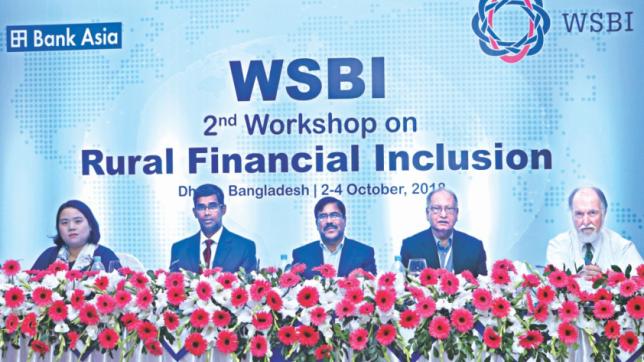One-third population financially excluded

One-third of the population in Bangladesh is still financially excluded because of the high cost of financial transaction and poor regulations, experts said yesterday.
Other major reasons for the exclusion include lack of banks' dedication to offer diversified services, existing collateral-based system for loan disbursement, low level of financial literacy, and information asymmetry, they said.
The observations came at the inaugural session of a workshop on rural financial inclusion, at Radisson hotel in Dhaka.
Bank Asia and the World Savings and Retails Banking Institute (WSBI) jointly organised the three-day event to focus on widening the access to basic financial services for people living in rural areas.
More than 50 banking leaders from nine countries in Asia took part in the event.
Mustafa K Mujeri, executive director of the Institute for Inclusive Finance and Development, said Bangladesh is performing well in terms of financial inclusion. But 33 percent of its people are still deprived of getting facilities from formal banks, non-banks and microfinance institutions.
Referring to a survey carried out by US-based InterMedia in 2016, Mujeri said 18 percent of the people aged over 15 have a full service account with banks and 22 percent are unbanked but have a multipurpose financial account with mobile financial services, agent banking or other formal channels.
Another 32 percent have access to the informal financial sector, he said.
The former director general of the Bangladesh Institute of Development Studies stressed the need for reducing the transaction cost and strengthening the regulatory frameworks to bring the unbanked people under the financial system.
Mohammed Arfan Ali, managing director of Bank Asia, said financial inclusion is a frequently discussed topic in Bangladesh as a huge number of people do not have access to banks.
It is crucial to have them on board, Ali said.
Except a few banks, many lenders, both public and private, are still far away from helping the unbanked people, he said.
Ali said the major reasons for maintaining the distance from the unbanked people are the profitability issue and the infrastructural ecosystem that comes with serving the underserved.
He, however, said banks alone cannot be blamed for this inadequacy of financial inclusion.
“There are many other barriers in the financial sector that we face to give a boost to the financial inclusion,” he said, citing the lack of proper infrastructure and low literacy rate.
Ali said technological innovation, introduction of alternative business models and accessibility of data can create a unique opportunity to drive financial inclusion.
Mina Zhang, senior adviser of the WSBI, said inability and high cost of financing for micro-enterprises remains a common challenge in rural areas for most countries.
“Rural areas are still cash-dominant. Bringing the illiterate rural villagers to the formal financial system and comforting them to use the service is very costly,” she said.
SM Moniruzzaman, deputy governor of the central bank, said financial inclusion has become one of the country's core strategies to achieve the sustainable development goals and the Seventh Five-Year Plan.
This is the second WSBI workshop. The first one was held in Beijing last year.
